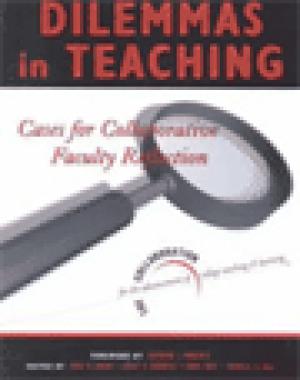Resources
Looks at a project by the American Association for Higher Education (AAHE) to develop cases about college teaching and learning that would prompt in-depth discussion of pedagogical issues. Work of Ted Marchese; Cases and how they can help reconnect process and content; Related readings; Addresses for more information.
Collected here, without examples or detailed explanations, are practices that constitute excellence in college teaching. These elements represent the broad range of the most effective actions teachers take, and requisite conditions teachers establish, to facilitate learning. The listing is brief and serves more as a reference to the scope of excellent teaching techniques than as a source of enlightenment. For detailed information on items that are unfamiliar, refer to the works cited.
Although listening has been shown to be the most frequent communication activity, and students desperately need listening training, the educational system usually ignores listening. After citing 10 bad listening habits which interfere with good aural communication and describing the characteristics of effective listeners, this paper offers 12 listening exercises that can be used by instructors in a wide variety of academic fields. Finally, the paper briefly describes a successful listening course taught at St. Edward's University in Austin, Texas, and its impact over the last 10 years. Thirteen references are attached.

It has been suggested that the greatest educational reform will come not through the sweeping changes of large institutionally mandated programs but through the small, day-to-day improvements that faculty members make in their own courses. The faculty is the first line of revolution in teaching; without their cooperation, no change is possible; with it, no challenge is impossible. This volume provides some insights into how individual instructors can make interesting changes in their classes and in their approaches to teaching in general. (From the Publisher)


Lowman expands his earlier model of effective teaching to place more emphasis on motivational skill and commitment to teaching. In this second edition, he presents still more options on how to organize classes and use group work to promote learning. (From the Publisher)

Covers Major Models of Teaching. Teaching Models. Designed for use as a main or supplemental text in undergraduate- or graduate-level courses entitled Elementary Curriculum, Introduction to Instruction, Introduction to Teaching, Models of Teaching, and Instructional Methods. (From the Publisher)

A rich compendium of classroom-tested strategies and suggestions designed to improve the teaching practice of beginning, mid-career, and senior faculty members. Forty-nine teaching tools cover both traditional tasks, writing a course syllabus, delivering a lecture and newer, broader concerns, such as responding to diversity, and using technology. (From the Publisher)

Any attempt to explain why someone is a good teacher--or is strongly motivated to teach effectively--involves a complex discussion of one of the oldest questions in human history: Why do people do what they do? In Teaching Well and Liking It, a distinguished group of internationally known scholars offers a sophisticated and stimulating look at the issues involved in motivating teachers to teach well in the challenging environment of the modern university. With college and university administrators worried about how to encourage faculty to devote energy to teaching, and students and their parents concerned that faculty are not dedicated to their teaching responsibilities, and faculty themselves feeling guilty and disappointed at their own failure to find satisfaction in teaching, the time is right for a book that explores the factors that inspire, nurture, and reward good teaching. Motivation, as volume editor James L. Bess points out, is a key factor when it comes to commitment, preparation, sustained effort, and performance in any work. In fact, the effectiveness of any system of higher education is highly contingent on the quality of the teaching enterprise. What is learned, how much is learned, and progress in the psychosocial maturation of the student learner depend on the willingness of college and university faculty to devote long hours to all aspects of teaching. This collection of essays examines personal motivation to teach--both internal and external--as well as organizational conditions such as job characteristics, leadership, and student diversity, and system-wide conditions such as career phases, public policy, politics, and the vagaries of the academicmarketplace. It addresses the issues both theoretically and practically, drawing on the academic and hands-on experience of authors from many fields, including psychology, higher education, business, public policy, and sociology. (From the Publisher)

Designed to spark reflection and lively dialogue in College and university departments and faculty development programs, Dilemmas in Teaching is a collection of short, insightful cases that will strike a chord with experienced faculty and help prepare newer faculty and teaching assistants for the complexities of their chosen profession. Written by faculty as part of a six-year project sponsored by The Collaboration for the Advancement of College Teaching & Learning, the twenty-nine cases are grouped in three sections, each with an introduction, focusing on the classroom, departments and institutions, and the changing culture in higher education. Features include a listing of case abstracts, discussion questions, essays about using cases in faculty development, and a bibliography. This collection is a useful resource for college, department, and faculty development center libraries — certain to be pulled off the shelf often for individual reflection and faculty development programming. (From the Publisher)